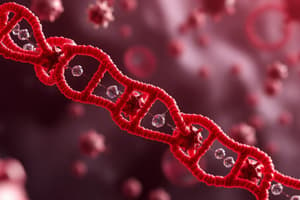Podcast
Questions and Answers
What is the main function of enzymes in biological processes?
What is the main function of enzymes in biological processes?
Which process primarily allows plants to convert sunlight into energy?
Which process primarily allows plants to convert sunlight into energy?
Which part of the plant is responsible for transporting water and minerals from the roots?
Which part of the plant is responsible for transporting water and minerals from the roots?
What type of reproduction involves the combination of sperm and egg cells?
What type of reproduction involves the combination of sperm and egg cells?
Signup and view all the answers
What role does the circulatory system play in animals?
What role does the circulatory system play in animals?
Signup and view all the answers
How do living organisms maintain a stable internal environment?
How do living organisms maintain a stable internal environment?
Signup and view all the answers
What is the function of the immune system in organisms?
What is the function of the immune system in organisms?
Signup and view all the answers
What is the difference between aerobic and anaerobic respiration?
What is the difference between aerobic and anaerobic respiration?
Signup and view all the answers
What can be a consequence of human activities like deforestation and pollution?
What can be a consequence of human activities like deforestation and pollution?
Signup and view all the answers
Which biological molecules are essential for energy and structural components in organisms?
Which biological molecules are essential for energy and structural components in organisms?
Signup and view all the answers
Study Notes
Characteristics of Living Organisms
- Living organisms share fundamental characteristics including growth, reproduction, response to stimuli, metabolism, and maintenance of homeostasis.
- These processes are carried out at the cellular level, the basic unit of life.
- Cells can be classified as prokaryotic or eukaryotic, each with unique structures and functions.
Cellular Processes
- Movement of substances into and out of cells occurs through various mechanisms like diffusion, osmosis, and active transport.
- These processes ensure a balanced cellular environment essential for maintaining proper cell function.
Biological Molecules
- Key biological molecules within cells include carbohydrates, proteins, lipids, and nucleic acids.
- Carbohydrates provide energy, proteins contribute to structure and function, lipids store energy and form cell membranes, and nucleic acids contain genetic information.
Enzymes and Cellular Reactions
- Enzymes act as biological catalysts, accelerating biochemical reactions within cells.
- These enzymes are crucial for efficient processes like digestion and energy production.
Plant Nutrition
- Plants obtain nutrition primarily through photosynthesis, a process where they utilize sunlight, carbon dioxide, and water to produce glucose (a form of sugar) and oxygen.
- Photosynthesis is essential for plant growth and provides the basis for energy transfer within ecosystems.
Plant Transport
- Transport in plants relies on two specialized tissues: the xylem and the phloem.
- Xylem transports water and minerals absorbed from the roots to the leaves.
- Phloem distributes nutrients, primarily sugars produced by photosynthesis, from the leaves to other parts of the plant.
Animal Transport
- In animals, the circulatory system is responsible for transport.
- The circulatory system distributes oxygen, nutrients, and removes waste products throughout the body.
Defense Mechanisms
- Organisms face threats from diseases caused by pathogens.
- Immune systems provide defense mechanisms against pathogens, protecting the body from infection and disease.
- The human immune system comprises various components that work together to identify and neutralize pathogens.
Human Respiratory System
- The human respiratory system facilitates gas exchange.
- The respiratory system enables oxygen to enter the blood and carbon dioxide to be expelled from the body.
Cellular Respiration
- Respiration is the process by which cells generate energy.
- Cellular respiration can occur aerobically (with oxygen) or anaerobically (without oxygen).
- Aerobic respiration is more efficient and generates more energy than anaerobic respiration.
Drugs and the Body
- Drugs can interact with and influence the body's functions.
- Drugs can be beneficial in treating illnesses, but misuse can lead to harmful effects.
Reproduction
- Reproduction is the process by which organisms create offspring, ensuring the continuation of their species.
- Reproduction can be sexual or asexual.
- Humans rely on sexual reproduction, involving the fusion of a sperm cell and an egg cell.
Human Impact on Ecosystems
- Organisms interact with their environment, influencing and being influenced by their surroundings.
- Humans have a significant impact on ecosystems through activities like deforestation, pollution, and habitat destruction.
- These activities can lead to biodiversity loss, habitat degradation, and ecosystem instability.
Studying That Suits You
Use AI to generate personalized quizzes and flashcards to suit your learning preferences.
Description
This quiz explores the fundamental characteristics of living organisms, highlighting cellular processes, biological molecules, and the role of enzymes in cellular reactions. Test your understanding of how cells function and interact with their environment, focusing on key concepts in biology.




